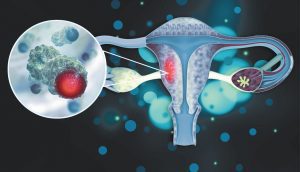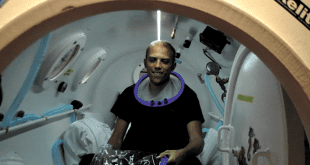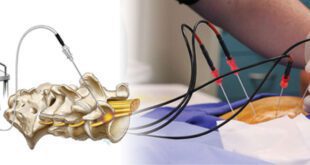By Parveen Vahora, M.D.
 Ovarian cancer often has no early symptoms, or the symptoms are confused with other disorders. Because it often gets diagnosed in later stages, it can be challenging to treat. If you have persistent bloating, distention, or a sensation of being full, these can be warning indicators.
Ovarian cancer often has no early symptoms, or the symptoms are confused with other disorders. Because it often gets diagnosed in later stages, it can be challenging to treat. If you have persistent bloating, distention, or a sensation of being full, these can be warning indicators.
Don’t ignore your symptoms, because the rate of the spread of ovarian cancer into the stomach or intestines can be rapid. Due to ovarian cancer’s stealthy symptoms, it is often referred to as a “silent killer,” but it doesn’t have to be that way. There are several other early symptoms that often get overlooked; these include, constipation, pain that lasts for one week or more, urinary changes (frequency, urgency, pain), loss of appetite or feeling full quickly.
Diagnosis
It’s critical to get regular women’s health and wellness exams. Your gynecologist is able to feel the ovaries and uterus to physically examine size, shape and any fixed growth. However, a transvaginal ultrasound (TVUS) is one of the best tools to diagnose ovarian cancer as well as other conditions such as fibroids and endometriosis, to name a few. There is also a blood test called CA-125, which can measure protein in the blood. Women with ovarian cancer tend to have high levels of CA-125 protein.
High Risk
You are considered high risk, due to genetic disorders such as BRCA gene mutations, Lynch syndrome, or a family history of breast or ovarian cancer. If you have ovarian cancer or a family history, you will qualify for genetic testing.
Genetic Testing
A sample of DNA is collected with a small sample of blood or saliva, which is then analyzed in a lab to look for evidence of genetic disorders or vulnerabilities of specific diseases. The information gathered from genetic testing is a powerful tool that can help your physician tailor medical care and treatment just for you.
Treatment
Ovarian cancer treatment is usually a combination of surgery and chemotherapy. Many times, one or both ovaries will be removed as well as the fallopian tubes, and in some cases a partial or full. Hysterectomy is recommended.
Vulvovaginal Atrophy (VVA)
If you have undergone treatment for ovarian cancer, have had an oophorectomy or hysterectomy, vaginal changes occur quickly due to a disruption in hormones and vulvovaginal tissues. You do not have to live in pain and discomfort. There are viable treatments that have helped countless women find relief and turn back the clock. Along with hormone replacement, there is an innovative procedure called MonaLisa Touch®.
MonaLisa Touch®
Now it’s possible to have relief from vulvovaginal atrophy due to the MonaLisa Touch’s® ability to gently improve the tissue of the vulvar and vaginal mucosa. No medications, no cutting, no lengthy healing times: This innovative laser therapy is for VVA. It’s quick, efficient, and can be safely performed in the comfort and privacy of Dr. Vahora’s office. With this treatment, women no longer have symptoms of dryness, pain, itching, or irritation. Women can enjoy intimacy once again. The MonaLisa Touch® treatment also helps urinary symptoms such as incontinence and urgency.
REGULAR WOMEN’S WELLNESS EXAMS ARE ESSENTIAL
Your Wellness Visit
Dr. Vahora can identify any concerns such as heavy bleeding pelvic pain, menopausal symptoms, low libido, and pain with intercourse. If you have a family history of cancer, genetic testing can be offered. These conditions can be further worked up, and custom-tailored procedures and treatment options can be addressed to meet your specific needs. We can also identify if you have vulvovaginal atrophy (VVA) or pain with intercourse and talk about treatment options including to see if you are a candidate for the MonaLisa Touch® treatment.
IF YOU HAVE BEEN PUTTING OFF YOUR GYNECOLOGICAL EXAM OR WELLNESS VISIT, NOW IS THE TIME TO MAKE AN APPOINTMENT.
Contact us today to schedule an appointment at Info@ParveenVahoraMD.com or during office hours call (727) 376-1536 or text (813) 548 4412.
To find out more, please visit ParveenVahoraMD.com or email info@ParveenVahoraMD.com.
Parveen Vahora, M.D.
Dr. Vahora specializes in pelvic pain and endometriosis and is passionate about educating fellow physicians and the community on these topics. She is fellowship trained in minimally invasive surgery. Another focus of hers is sexual health and she offers MonaLisa Touch® for patients who have issues from having children, going through menopause, as well as post-menopausal women, cancer survivors, and those suffering from pain during intercourse or intense dryness or incontinence or prolapse.
 Central Florida Health and Wellness Magazine Health and Wellness Articles of the Villages
Central Florida Health and Wellness Magazine Health and Wellness Articles of the Villages



